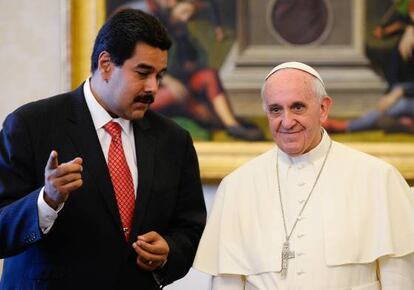Maduro discusses political situation with Pope Francis
Venezuelan leader seeks recognition for his government FAO fetes Venezuela for Chávez’s nutritional policies

In an effort to seek support for his government in the face of opposition charges of voter fraud during April’s election, Venezuelan President Nicolás Maduro met on Monday with Pope Francis I at the Vatican to try to smooth over more than 10 years of rocky relations between his country and the Holy See.
The Vatican Press Office said in a statement that the 20-minute meeting between the Argentinean-born pope and the successor to the late President Hugo Chávez was held in a “cordial atmosphere.”
“It was agreed that there is a need for a serious and continuous dialogue between the Episcopal Conference and the government for the benefit of the entire nation,” the Vatican said.
The strained relations between Venezuela and the Holy See go back more than a decade when the Socialist leader Chávez accused the Catholic hierarchy in his country of meddling in politics and his government’s social programs. In 2002, he accused the Catholic leaders of supporting a coup led by businessman and military officers that ousted him for 48 hours.
The pope and Maduro touched on the “political and social situation in the country following the recent loss of Hugo Chávez,” the statement said. Chávez died from cancer on March 5. The two also discussed “diverse current problems,” such as “poverty and the fight against crime and drug traffickers.”
The opposition has been critical of Maduro’s trip to the Vatican but has thanked Pope Francis for his concerns about the situation in Venezuela. Last week opposition leader Henrique Capriles sent the pope a letter asking him to try to help broker a dialogue between him and the government over voting irregularities that he says took place during the April 14 elections, in which he narrowly lost to Maduro.
He reminded the pope that that Catholic Church’s Social Doctrine states that a true democracy "is not only the result of a formal respect for the rules, but is also the result of the true acceptance of the values that inspire democratic procedures" such as human rights, and respect for the dignity of the individual.
Besides using his meeting with the pope as political clout, Maduro also touted a prize given to the Venezuelan government by the Food and Agriculture Organization (FAO) for the policies introduced by Chávez to reduce hunger in the country. The Rome-based FAO places Venezuela among 15 nations distinguished for their “exceptional progress” in reducing starvation across those countries combined by 13.5 percent in the period from 1990 to 1992 and less than five percent from 2010 to 2012.
“It was one of the most beautiful causes he dedicated his life to,” Maduro said of Chávez, who governed from 1999 to 2012.
The opposition immediately found irony in the prize, which was awarded to a nation that is struggling with severe shortages of basic foodstuffs, such as rice, beans, cornmeal, chicken and other goods. “This organization is rewarding starvation, shortages and inflation,” said opposition deputy Julio Borge in the National Assembly. “With billions of dollars in petroleum revenue coming in, there are still 2.5 million people living in extreme poverty.”
Maduro has initiated an international offensive to counter the negative impression caused by the election crisis, including the beating up of several opposition deputies in the National Assembly, and which still exists over his refusal to hold a vote audit as Capriles’ supporters are demanding. Even though there are signs that tensions have subsided, the political crisis is far from over.
Foreign Minister Elías Jaua made an official trip to Madrid last week while Diosdado Cabello, the National Assembly speaker and the second-most powerful man in government, traveled to Havana for talks with the Castro brothers.
The opposition meanwhile has been making its international rounds. Earlier this month, the Maduro government complained to Bogota after Capriles held talks with President Juan Manuel Santos and later showed up at a press conference accompanied by top Colombian government officials.
Tu suscripción se está usando en otro dispositivo
¿Quieres añadir otro usuario a tu suscripción?
Si continúas leyendo en este dispositivo, no se podrá leer en el otro.
FlechaTu suscripción se está usando en otro dispositivo y solo puedes acceder a EL PAÍS desde un dispositivo a la vez.
Si quieres compartir tu cuenta, cambia tu suscripción a la modalidad Premium, así podrás añadir otro usuario. Cada uno accederá con su propia cuenta de email, lo que os permitirá personalizar vuestra experiencia en EL PAÍS.
¿Tienes una suscripción de empresa? Accede aquí para contratar más cuentas.
En el caso de no saber quién está usando tu cuenta, te recomendamos cambiar tu contraseña aquí.
Si decides continuar compartiendo tu cuenta, este mensaje se mostrará en tu dispositivo y en el de la otra persona que está usando tu cuenta de forma indefinida, afectando a tu experiencia de lectura. Puedes consultar aquí los términos y condiciones de la suscripción digital.








































